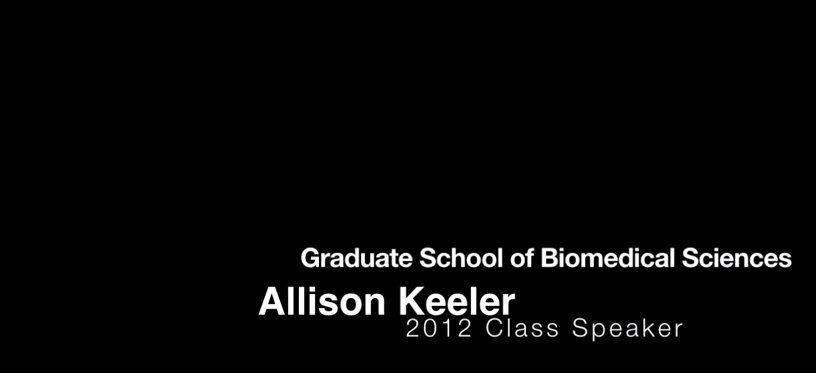Allison M. Keeler said she was completely surprised and very pleased to be chosen as class speaker for the Graduate School of Biomedical Sciences. Her experience at UMMS was “so phenomenal,” she looks forward to paying tribute to those who have mentored her, and offering some thoughts on what she’s learned.
A graduate of the Rochester Institute of Technology, Keeler spent two years at Duke University studying HIV and came to UMMS interested in how viruses can cause cancer. But a laboratory rotation in the Gene Therapy Center changed that. She started on a project with Terence R. Flotte, MD, the Celia and Isaac Haidak Professor of Medicine, executive deputy chancellor, provost and dean of the School of Medicine, who is also an internationally known pioneer in the field of gene therapy, and Keeler found her field.
After graduation, she’ll be heading east to Harvard, where she’ll work with another of the top experts in the field, Luk Vandenberghe, PhD, newly arrived from his role as director of translational research in the gene therapy program at the University of Pennsylvania. Dr. Vandenberghe is establishing a gene therapy program for diseases of the eye at the Massachusetts Eye and Ear Infirmary.
“There is so much potential in the field of gene therapy,” Keeler said. “Eye gene therapy is likely to be the first gene therapy actually licensed for therapeutic use, and this will open the door for what may potentially be treatments for many conditions.”
Keeler finished her work in five years—less than the average length of time for PhD research—in part because she fell in love with the work she was doing. She also fell in love outside of the lab, this time on the volleyball court. Keeler plays competitive volleyball, and on a tournament trip to Minnesota, she met pharmacy technician and volleyball player John Klunk, the relative of a teammate. The two will marry the day before Commencement. (Yes, the day before Commencement.)
Because Keeler is originally from Pennsylvania, and has many family members coming for Commencement, she said it just made sense to do it all one weekend. “But it has been busy.”
Her Commencement speech will be about lessons learned the hard way in graduate school. “Graduate school is so different from other courses of study,” she observed. “You are learning so much, but what you’re also learning is to be an independent scientist.”
“In my opinion, Allison is a prototype of an outstanding GSBS student, very worthy of being the Class of 2012 speaker,” said Dr. Flotte. “Her focus and creative intellect have resulted in both great science and a potential for benefit to patients. Along with her student leadership and her dedicated community service, she has the characteristics that I believe the class would most like to see exemplified in its speaker. I feel very fortunate to have had her as a student in my laboratory.”
Keeler acknowledged that she has a lot to say as class speaker—so much so that it was a challenge to distill her remarks down to meet the time limit. “I was thinking that once I’m up there, no one’s going to stop me if I go a little over time,” she said with a smile. “But then I remembered all the Secret Service who will be there (because of Commencement speaker Ellen Johnson Sirleaf, president of Liberia), so I figured I had better play it safe and keep to the rules.”
Related links on UMassMedNow:
Commencement, part 1: 39th Commencement marks endings and beginnings
Commencement, part 2: UMMS faculty forge strong bonds with Liberia
Commencement, part 3: Honorary degrees strengthen Commencement tradition.
Commencement, part 4: Muthee personifies the American dream
